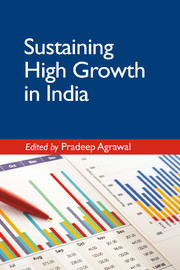Book contents
- Frontmatter
- Contents
- List of Tables
- List of Graphs and Maps
- Preface
- Introduction
- Section 1 Ensuring Macroeconomic Stability for Sustaining High Growth Rates
- Section 2 Promoting Industrial Development for Sustaining High Growth Rates
- Section 3 The International Economic Issues and Sustaining High Growth
- Section 4 Infrastructure Bottlenecks to Sustaining High Growth
- 10 Infrastructure, Human Capital and Economic Growth: A Quantitative Analysis for India
- 11 Elementary Education in India: A Study of Accessibility and Quality
- 12 Education and Economic Growth: A Comparative Study of China and India
- Section 5 Some Socio-political Issues in Sustaining High Growth
- List of Contributors
- Obituary
- Index
10 - Infrastructure, Human Capital and Economic Growth: A Quantitative Analysis for India
from Section 4 - Infrastructure Bottlenecks to Sustaining High Growth
Published online by Cambridge University Press: 08 February 2018
- Frontmatter
- Contents
- List of Tables
- List of Graphs and Maps
- Preface
- Introduction
- Section 1 Ensuring Macroeconomic Stability for Sustaining High Growth Rates
- Section 2 Promoting Industrial Development for Sustaining High Growth Rates
- Section 3 The International Economic Issues and Sustaining High Growth
- Section 4 Infrastructure Bottlenecks to Sustaining High Growth
- 10 Infrastructure, Human Capital and Economic Growth: A Quantitative Analysis for India
- 11 Elementary Education in India: A Study of Accessibility and Quality
- 12 Education and Economic Growth: A Comparative Study of China and India
- Section 5 Some Socio-political Issues in Sustaining High Growth
- List of Contributors
- Obituary
- Index
Summary
INTRODUCTION
Growth in Gross Domestic Product (GDP) is one of the most important indicators of a country's economic performance, as it reflects better standards of living. Growth can also help alleviate poverty, especially when accompanied with a declining or stable inequality. However, sources of growth are very complex and varied in nature. This chapter examines the effect of one such major source of growth, infrastructure and human capital, in the context of India.
India is one of the fastest growing nations in the world. However, to sustain this growth, it is imperative to further augment investment in the economy. There is an acute need to further improve physical infrastructure, like transportation, telecommunication, electricity, energy, etc., as it reduces transaction and input costs, fosters investment and trade and raises productivity. Optimal investment in this sector should lead to an expansion of the manufacturing and service sectors, the creation of new jobs, an increase in the purchasing power of consumers and hence growth in the national income. Expenditure on social infrastructure like education and health services provides the economy with skilled and productive human capital, which leads to an increase in productivity, and thereby, economic growth. Given the likely importance of physical and social infrastructure to achieve and sustain high economic growth, a study based on this issue would be useful for an emerging economy like India from the policy prospective.
Considerable literature is available on the association between infrastructure and economic growth, including time series and panel data analysis. Many studies, such as Canning and Pedroni (2004), Easterly and Rebelo (1993), Calderón and Serven (2004) and Esfahani and Ramirez (2003) and some regional studies in India by Fan et al. (2000), Lall (2007) and Sahoo and Dash (2009, 2012) show that physical infrastructure like transportation, communication, power and telephones promote efficiency in the market by reducing the time spent on transit and thus promote economic growth. On the other hand, Devarajan et al. (1996), Agénor (2009) and Hulten and Schwab (1993) are of the view that countries stand to gain more by allocating their resources for the maintenance and operation of the existing infrastructure rather than building new projects to promote growth.
- Type
- Chapter
- Information
- Sustaining High Growth in India , pp. 295 - 314Publisher: Cambridge University PressPrint publication year: 2017



